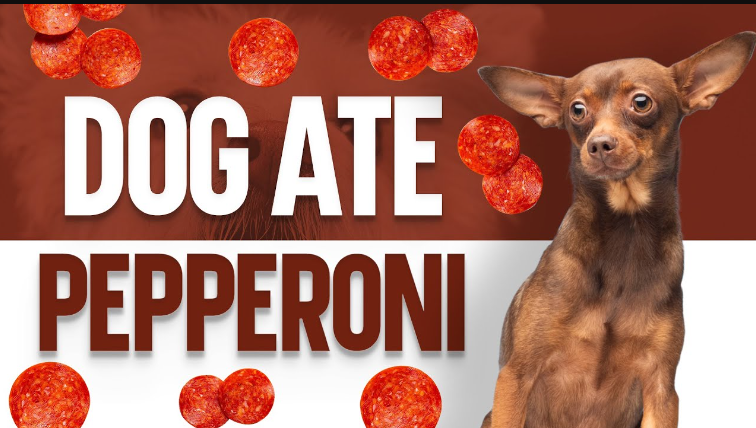Can Dogs Eat Pepperoni?: Vet-Sourced Advice on Snacks!

Dogs should not eat pepperoni as it contains harmful spices and excessive fat. Feeding them pepperoni can lead to health issues.
Pepperoni, a favourite pizza topping among many, might be tempting to share with your canine friend, but resisting the urge is essential. This spiced sausage is too rich in sodium and fat, ingredients unsuitable for a dog’s diet.
The health risks associated with pepperoni include obesity and pancreatitis, not to mention potential digestive problems. Pet owners must be cautious with their dog’s diet, ensuring safe and appropriate treats. Opt for healthier snack alternatives designed for dogs instead of processed human foods. Remember, balancing your furry companion’s nutrition is crucial for their well-being and longevity. Choose wisely; your dog will thank you for a healthier life.
Contents
- 1 Pepperoni And Pups: A Dangerous Combo?
- 2 Salt And Spices: A Toxic Duo For Dogs
- 3 Digestive Distress: Can Pepperoni Cause Harm?
- 4 Calories And Canines: Weighing The Risks
- 5 The Pancreas Problem: High-fat Foods Explained
- 6 Alternatives To Pepperoni: Safe Snacks For Snouts
- 7 Understanding The Allergic Angle
- 8 Final Vet Verdict: Should Dogs Eat Pepperoni?
- 9 Conclusion
Pepperoni And Pups: A Dangerous Combo?
Many dog owners love sharing snacks with their furry friends. But what about pepperoni? Is it safe for dogs? The truth may surprise you. While a tiny piece of pepperoni won’t likely send your dog to the vet, regular consumption can be harmful. Let’s dive into why pepperoni might be a risky treat for your pup.
The Spicy Truth: Ingredients In Pepperoni
Pepperoni is more than just spicy for humans. It contains ingredients that are not dog-friendly. Here is what’s inside:
- Salt: This can lead to sodium ion poisoning.
- Garlic and onions: Toxic to dogs; can cause anaemia.
- Spices: Can upset a dog’s stomach.
- Preservatives: Harmful chemicals like BHA and BHT.
Together, these ingredients create a snack far from ideal for canine consumption.
Fat Content And Canine Health Concerns
Pepperoni is high in fat. Excessive fat can lead to pancreatitis in dogs.
| Comparison of Fat Content | |
| Treat | Fat Content |
| Pepperoni | High |
| Regular Dog Treat | Low to Moderate |
| Approximate values used for illustration purposes. | |
Not only is the high-fat content a problem, but too much pepperoni can lead to obesity and related health issues like arthritis.
Salt And Spices: A Toxic Duo For Dogs
When treating our furry friends, pepperoni is a tasty snack. But salt and spices that could harm your dog are hidden within those slices. Understanding why these dangerous ingredients can help keep your pup safe and healthy.
Why Salt Is A No-go For Dog Diets
Dogs need only a little salt in their diets, and too much can lead to serious health issues. A slice of pepperoni packs a high salt content that exceeds what a dog can safely consume.
- Excessive thirst and urination – indicate salt poisoning
- Potential for kidney damage – when a dog’s salt intake is too high
- Sodium ion poisoning – can be fatal in severe cases
Always ensure fresh water is available and avoid salty treats to prevent these risks.
Spices That Spell Trouble For Your Pet
Spices add flavour but aren’t suitable for dogs. Common seasonings in pepperoni, like garlic and onion powder, are toxic to dogs and can cause gastrointestinal upset or anaemia.
| Spice | Effect on Dogs |
| Garlic | Damage to red blood cells |
| Onion Powder | Gastrointestinal irritation |
| Paprika | Irritation, possible digestive distress |
Spotting these ingredients on labels can save your dog from discomfort or worse. Choose dog-safe treats instead.
Digestive Distress: Can Pepperoni Cause Harm?
Dog owners love sharing snacks with their furry friends. But is pepperoni safe for dogs? While a tiny piece might not cause immediate problems, regular consumption can lead to digestive distress.
Acute Gastrointestinal Issues
Pepperoni is rich in fats and spices that can upset a dog’s stomach. Signs of acute gastrointestinal issues include:
- Vomiting
- Diarrhea
- Lethargy
- Dehydration
This spicy treat can lead to pancreatitis, a severe condition. Small, active dogs are especially at risk. Veterinary attention is crucial if a dog shows these symptoms after eating pepperoni.
Chronic Effects On Canine Digestion
Long-term effects of a pepperoni-rich diet in dogs include:
- Weight Gain: Pepperoni’s high calories contribute to obesity.
- Digestive Issues: Regular eating can cause chronic stomach upsets.
- Food Intolerances: Over time, dogs may develop sensitivities to ingredients in pepperoni.
Pepperoni’s high sodium and nitrates also pose risks. These can lead to high blood pressure and other health issues in dogs. Always think twice before offering your dog this human-favored snack.
Calories And Canines: Weighing The Risks
Every dog owner loves to spoil their furry friends with treats, but it’s crucial to consider the impact of extra calories on their health. Many households wonder whether dogs can safely enjoy human snacks like pepperoni, so it’s time to discuss calorie content and potential risks.
Obesity In Dogs: A Growing Concern
Obesity in dogs is on the rise and can lead to serious health issues. Vets often point out that maintaining a healthy weight is crucial to a dog’s wellbeing. Excess weight can cause joint pain, diabetes, and heart problems. So, calorie content should always be a priority when treating your dog.
How Treats Like Pepperoni Add Up
While pepperoni might seem tasty, it’s packed with calories, sodium, and fat. These can add up quickly, leading to potential weight gain. A small slice of pepperoni might not seem like much, but balancing treats are within your dog’s daily calorie intake.
| is importantPepperoni Slice | Calories | Sodium | Fat |
| 1 Slice | 26 | 98 mg | 2.2 g |
Remember, a small dog breed needs fewer calories than a large breed. Hence, even a single slice can have a significant impact.
- Check the serving size: Small amounts can still be added to calorie intake.
- Consider health risks: High fat content can lead to long-term issues.
- Opt for healthier alternatives: Choose dog-specific treats designed for their dietary needs.
The Pancreas Problem: High-fat Foods Explained
Imagine your dog’s pancreas as a small but mighty organ with a big job. It helps digest food and manage sugar. Now, picture what happens when high-fat treats like pepperoni crash the party. The extra fat can cause an upset. This may lead to pancreatitis, a severe health issue for dogs.
Feeding your dog foods loaded with fat is like fueling a fire. It can be dangerous. Even small amounts of pepperoni might harm your furry friend. Let’s understand why high-fat foods are a risk and what we can do to keep our pets healthy.
Pancreatitis In Dogs: A Vet’s Warning
Pancreatitis means inflammation of the pancreas. When dogs overeat fat, their pancreas gets inflamed. It causes pain and other severe symptoms. Symptoms include:
- Vomiting
- Diarrhea
- Loss of appetite
- Abdominal pain
Veterinarians warn that treats like pepperoni can trigger this painful condition. To protect your dog’s health, avoid high-fat snacks.
Managing Fats In Your Dog’s Diet
It’s crucial to regulate fats in your dog’s meals. A balanced diet keeps your dog fit and happy. Here are some tips:
| Do’s | Don’ts |
| Choose lean meats | Offer fatty snacks |
| Read pet food labels | Ignore nutrition information |
| Consult with your vet | Assume all foods are safe |
Keep an eye on the fat content in the food you give your dog. For a healthy diet, select items low in fat. Ask your vet about safe alternatives to pepperoni. They can suggest healthy snacks that won’t harm your dog’s pancreas.
Alternatives To Pepperoni: Safe Snacks For Snouts
Dog owners often wonder if sharing human snacks with their furry friends is safe. While pepperoni might seem like a tasty treat, there are better choices. Thankfully, plenty of safe and healthy alternatives will help dog parents keep their pets happy without risking their health.
Vet-approved Treats For Rewards
Vet-approved treats are a great way to reward your dog. These treats are designed to be both delicious and nutritious. Vets recommend looking for options with limited ingredients or single-protein snacks that are easily digestible and free from common allergens like corn, wheat, and soy.
- Dried meat treats such as chicken strips or duck bites
- Special dental chews that help clean teeth while satisfying chew instincts
- Freeze-dried fruits and veggies, perfect for a low-calorie snack
Homemade Healthy Snacks For Dogs
Making homemade treats can be a fun activity that also ensures you know exactly what’s going into your dog’s diet. Simple recipes often require only a few ingredients.
| Ingredient | Health Benefit |
| Pumpkin | Rich in fibre, it helps with digestion |
| Carrots | Good for teeth, low in calories |
| Apples | It contains vitamins, freshens breath |
| Oatmeal | High in soluble fibre, it is excellent for older dogs |
Avoid using seeds, cores, pits, or added sugar or spices in your homemade snacks.
Understanding The Allergic Angle
When considering treats for your furry friend, it’s crucial to understand the allergic angle. Not all snacks are safe for dogs, and pepperoni comes with caution flags. While many dogs salivate over this spicy sausage, some canines may have allergic reactions that pet parents must watch for.
Identifying Allergies In Dogs
Pet allergies often go unnoticed until they cause health problems. Symptoms can include skin irritation, digestive issues, or respiratory distress. It’s vital to observe your dog after giving them new foods. Monitor for any discomfort or unusual behaviour that may signal an allergic reaction.
Common allergy indications include:
- Excessive itching or licking
- Red, inflamed skin
- Chronic ear infections
- Runny eyes or nose
- Vomiting or diarrhoea
Dogs And Meat Allergies: Reading The Signs
Some dogs can have meat allergies, pepperoni being one potential culprit. Meat allergies often manifest through skin conditions or gastrointestinal distress. If your dog shows any of these symptoms after eating pepperoni, it could be a sign of an allergy:
| Symptom | What to Look For |
| Skin Issues | Bumps, rashes, or hives |
| Stomach Upset | Lack of appetite, vomiting, or diarrhoea |
| Respiratory Symptoms | Difficulty breathing or coughing |
Dogs with meat sensitivities may also be lethargic or show changes in behaviour. Always consult your veterinarian if your dog is reacting poorly to certain foods. They can offer guidelines or recommend allergy tests to ensure your pet’s health and wellbeing.
Always opt for dog-safe treats and avoid those that may cause them harm. You can keep your dog healthy while enjoying snack time with care and attention.
Final Vet Verdict: Should Dogs Eat Pepperoni?
Many pet owners wonder about sharing their favourite snacks with their furry friends. Is pepperoni safe for dogs? It’s common to want to treat your pet, but it’s crucial to consider their health. Pepperoni is a processed meat rich in sodium and fat, unsuitable for a dog’s diet. Vets often recommend against sharing such treats with canines.
Professional Advice On Canine Diets
Veterinarians caution against feeding dogs human snacks. Dogs have different dietary needs from humans, and human foods can contain harmful ingredients.
- Spices and seasonings in pepperoni may upset a dog’s stomach.
- High fat and salt content can lead to obesity and heart issues.
- Garlic and onion powder, often found in pepperoni, are toxic to dogs.
Creating A Balanced Meal Plan For Your Dog
| Nutrient | Benefits | Safe Sources |
| Protein | Builds muscle and repairs tissue | Lean meat, eggs, fish |
| Fats | Provides energy | Flaxseeds, fish oil |
| Carbohydrates | Offers energy and fibre | Whole grains, vegetables |
A balanced diet is vital for your dog’s health. Include a variety of nutrients to support their wellbeing. Always check with your vet. They can provide a meal plan that suits your dog’s specific needs.
Conclusion
In sum, pepperoni isn’t recommended for dogs. While a small piece occasionally might not harm, risks like high sodium and fat outweigh the benefits. Choose safer treats for your pup’s health and consult your vet for dietary advice. Remember, a happy dog is a healthy dog—steer clear of pepperoni for the best care.




